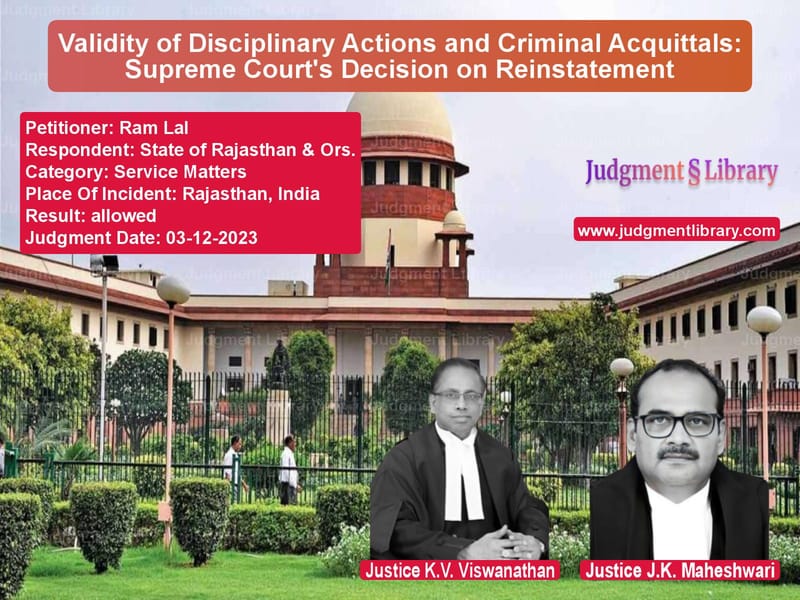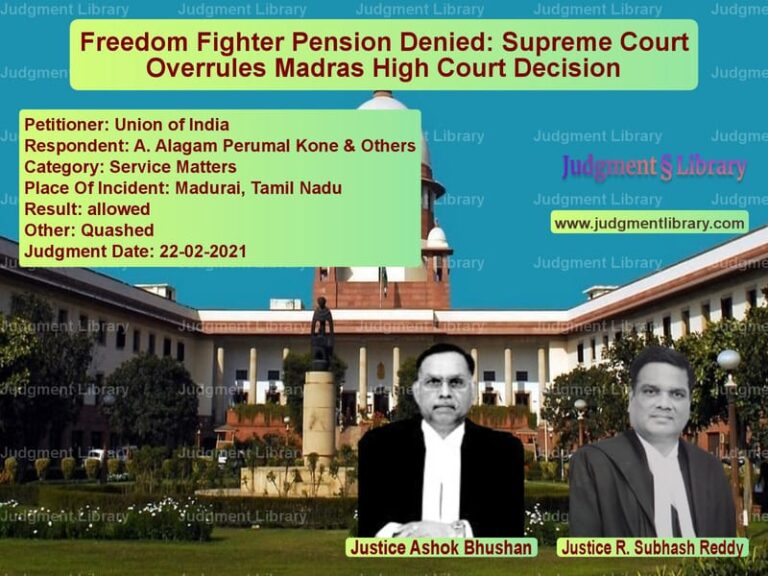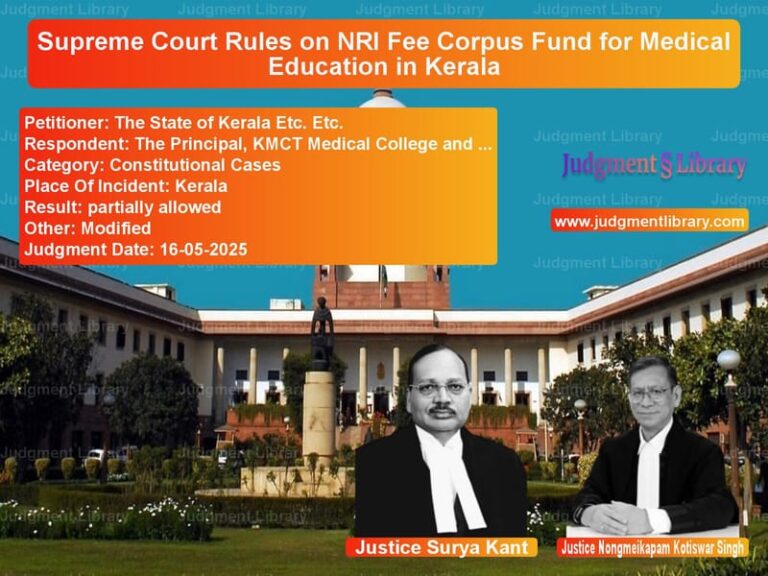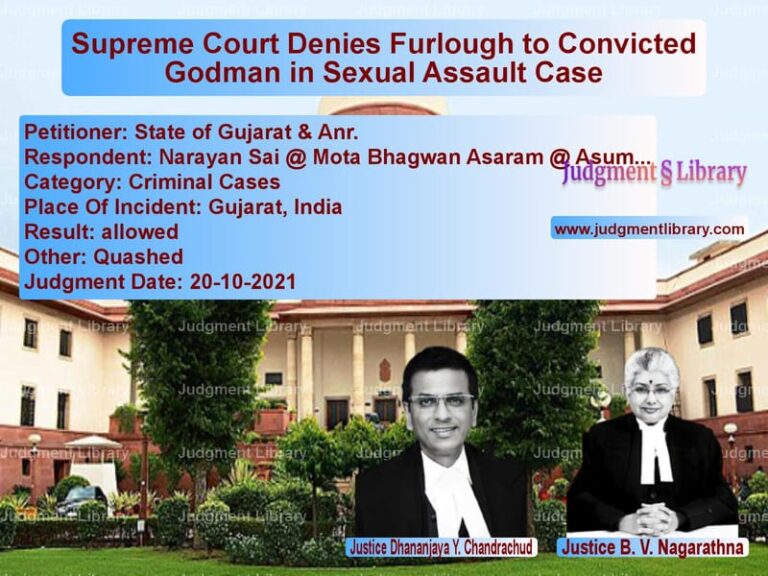Validity of Disciplinary Actions and Criminal Acquittals: Supreme Court’s Decision on Reinstatement
The case before the Supreme Court of India concerns an important issue of disciplinary actions within the Rajasthan Armed Constabulary, where the appellant, Ram Lal, was dismissed from his position as a constable for allegedly falsifying his date of birth on his marksheet to gain employment. However, despite a conviction in the initial criminal trial, the appellant was acquitted on appeal. The primary issue raised in this case was whether the dismissal from service, which was based on the same charges as the criminal proceedings, should stand in light of the acquittal in the criminal case.
In this case, the appellant’s date of birth was altered from 21.04.1974 to 21.04.1972 in his marksheet to make him appear as having attained the age of majority at the time of his recruitment. This fraudulent alteration was the basis for both the disciplinary proceedings and the criminal case against the appellant. Despite being acquitted in the criminal trial, the appellant continued to face dismissal from service, and subsequent appeals for reinstatement were rejected. The appellant then sought justice through a writ petition in the Supreme Court, challenging the dismissal on the grounds of the criminal acquittal and the lack of a fair disciplinary process.
Petitioner’s Arguments
The appellant, Ram Lal, argued that his dismissal from the Rajasthan Armed Constabulary was unjust and based on an error in the departmental proceedings. The specific points made by the petitioner were:
- The appellant was acquitted in the criminal trial by the Appellate Court, which found that the charges against him were not proven beyond a reasonable doubt. Therefore, he should not have been dismissed from service based on the same charges that were found not guilty in the criminal trial.
- The departmental inquiry and the criminal trial had examined the same facts, used the same witnesses, and dealt with the same allegations. The appellant argued that the outcome of the criminal trial should influence the disciplinary proceedings.
- The appellant’s defense was that the alteration in the marksheet was due to an inadvertent error, not a fraudulent act. He had clarified that the error was made when correcting the year of his birth in the application form, and this was a minor mistake, not an intentional fraud to secure employment.
- The appellant contended that the failure of the disciplinary authority to consider key evidence, such as the original 8th-class marksheet and the testimony of witnesses, rendered the dismissal unfair.
Respondent’s Arguments
The respondents, the State of Rajasthan, and the Rajasthan Armed Constabulary, presented the following defense:
- The respondents argued that the dismissal from service was based on solid evidence that the appellant had altered his date of birth in the application for recruitment. The alteration was done to present a false age, thereby gaining an unfair advantage in the recruitment process.
- They claimed that the appellant’s criminal acquittal did not automatically reverse the findings in the departmental inquiry. The standard of proof in criminal trials is different from that in departmental proceedings, and the acquittal did not invalidate the facts established during the internal inquiry.
- Even though the criminal trial had concluded in acquittal, the departmental proceedings were valid since they were based on a different standard of proof, and the charges in the departmental inquiry were substantiated by the witnesses and documentary evidence.
Supreme Court’s Observations
The Supreme Court, in its deliberations, focused on the interplay between the criminal acquittal and the disciplinary action taken by the Rajasthan Armed Constabulary. The Court made the following observations:
- The Court acknowledged the distinct standards of proof in criminal trials and departmental inquiries. While an acquittal in a criminal case does not automatically reverse disciplinary proceedings, the Court found that in this case, the evidence in both proceedings was identical. The witnesses in both the criminal trial and the departmental inquiry were the same, and the charges were substantially the same.
- The Court noted that the disciplinary authority had not given sufficient weight to key evidence, such as the original 8th-class marksheet, which corroborated the appellant’s claim that there was no deliberate alteration of his date of birth. The original marksheet indicated the date of birth as 21.04.1972, and the inquiry did not sufficiently address this evidence.
- Referring to past judgments, the Court emphasized that in cases where the criminal and departmental proceedings are based on the same facts and the criminal court acquits the accused, the disciplinary authority must reconsider the punishment. The disciplinary authority’s failure to consider the acquittal and the crucial evidence presented in the criminal trial resulted in an unfair dismissal of the appellant.
- The Court also referred to previous case law, particularly the decision in G.M. Tank vs. State of Gujarat & Others, where the Court held that if the charges in the departmental inquiry were found to be disproved or the prosecution had failed to prove the charges, the disciplinary action should be quashed.
Final Judgment
The Supreme Court ruled in favor of the appellant, Ram Lal, and set aside the orders of dismissal passed by the disciplinary authority. The key points of the judgment were:
- The appellant’s dismissal from service was quashed as the disciplinary proceedings were found to be vitiated by the failure to consider key evidence, such as the original 8th-class marksheet and the acquittal in the criminal trial.
- The Court directed that the appellant be reinstated in his position with all consequential benefits, including seniority, notional promotions, and fitment of salary.
- While the appellant was entitled to back wages, the Court awarded 50% of the back wages, acknowledging the time lost due to the prolonged legal proceedings.
- The judgment emphasized that the disciplinary authority must ensure that all material evidence is considered before taking action and that unfair dismissal based on insufficient consideration of evidence is not acceptable.
Conclusion
The Supreme Court’s ruling in this case highlights the importance of fair proceedings in both criminal and departmental matters. It reaffirms that the outcome of a criminal trial, especially one in which the accused is acquitted, should be given due weight in subsequent disciplinary actions, particularly when the evidence in both proceedings is identical. The judgment also emphasizes the need for the disciplinary authority to consider all material evidence before making any decisions that could severely affect an individual’s career and livelihood. This case serves as a reminder that justice in disciplinary matters must be based on fairness, thorough examination of evidence, and respect for due process.
Petitioner Name: Ram Lal.Respondent Name: State of Rajasthan & Ors..Judgment By: Justice K.V. Viswanathan, Justice J.K. Maheshwari.Place Of Incident: Rajasthan, India.Judgment Date: 03-12-2023.
Don’t miss out on the full details! Download the complete judgment in PDF format below and gain valuable insights instantly!
Download Judgment: ram-lal-vs-state-of-rajasthan-&-supreme-court-of-india-judgment-dated-03-12-2023.pdf
Directly Download Judgment: Directly download this Judgment
See all petitions in Disciplinary Proceedings
See all petitions in Termination Cases
See all petitions in Employment Disputes
See all petitions in Public Sector Employees
See all petitions in Judgment by K.V. Viswanathan
See all petitions in Judgment by J.K. Maheshwari
See all petitions in allowed
See all petitions in supreme court of India judgments December 2023
See all petitions in 2023 judgments
See all posts in Service Matters Category
See all allowed petitions in Service Matters Category
See all Dismissed petitions in Service Matters Category
See all partially allowed petitions in Service Matters Category







